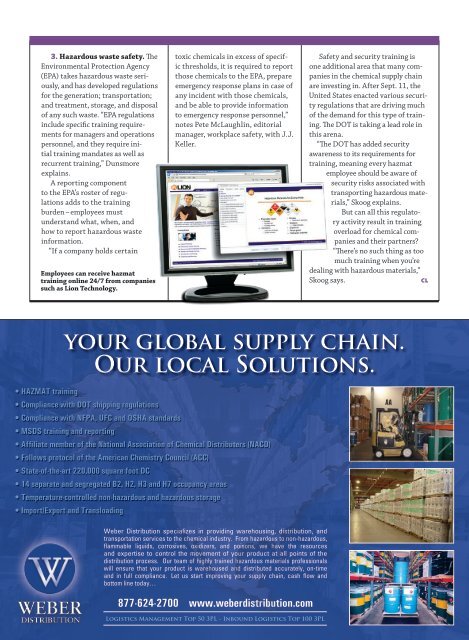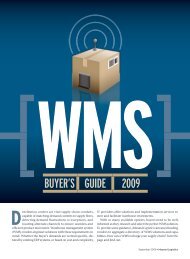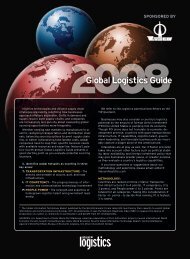Chemical Logistics - Inbound Logistics
Chemical Logistics - Inbound Logistics
Chemical Logistics - Inbound Logistics
You also want an ePaper? Increase the reach of your titles
YUMPU automatically turns print PDFs into web optimized ePapers that Google loves.
3. Hazardous waste safety. The<br />
Environmental Protection Agency<br />
(EPA) takes hazardous waste seriously,<br />
and has developed regulations<br />
for the generation; transportation;<br />
and treatment, storage, and disposal<br />
of any such waste. “EPA regulations<br />
include specific training requirements<br />
for managers and operations<br />
personnel, and they require initial<br />
training mandates as well as<br />
recurrent training,” Dunsmore<br />
explains.<br />
A reporting component<br />
to the EPA’s roster of regulations<br />
adds to the training<br />
burden – employees must<br />
understand what, when, and<br />
how to report hazardous waste<br />
information.<br />
“If a company holds certain<br />
Employees can receive hazmat<br />
training online 24/7 from companies<br />
such as Lion Technology.<br />
toxic chemicals in excess of specific<br />
thresholds, it is required to report<br />
those chemicals to the EPA, prepare<br />
emergency response plans in case of<br />
any incident with those chemicals,<br />
and be able to provide information<br />
to emergency response personnel,”<br />
notes Pete McLaughlin, editorial<br />
manager, workplace safety, with J.J.<br />
Keller.<br />
Safety and security training is<br />
one additional area that many companies<br />
in the chemical supply chain<br />
are investing in. After Sept. 11, the<br />
United States enacted various security<br />
regulations that are driving much<br />
of the demand for this type of training.<br />
The DOT is taking a lead role in<br />
this arena.<br />
“The DOT has added security<br />
awareness to its requirements for<br />
training, meaning every hazmat<br />
employee should be aware of<br />
security risks associated with<br />
transporting hazardous materials,”<br />
Skoog explains.<br />
But can all this regulatory<br />
activity result in training<br />
overload for chemical companies<br />
and their partners<br />
“There’s no such thing as too<br />
much training when you’re<br />
dealing with hazardous materials,”<br />
Skoog says. <br />
CL

















